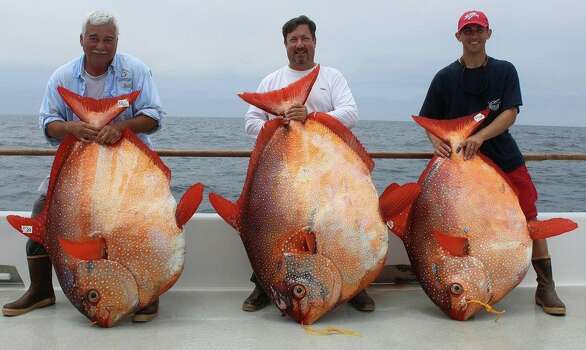
Armando Castillo, Joe Ludlow and Travis Savala hold their rare opah catches, weighing 151, 180 and 124 pounds respectively. The fish were caught at the same time Friday, about 125 miles southeast of San Diego.
Alan: I am an omnivore born and bred. I will go to my grave eating the flesh of other sentient beings. Even so, I am ever more appalled by my habit, find myself frequently aghast at its corollary manifestations and see - with painful clarity - how "wrong" it is to treat the great children of the Mysterium Magnum with such smiling cruelty. Absent a sea change in outlook, I pine for the bio-engineers who will put great slabs of exquisite steak on our plates without the nasty interval of slaughter.
SAN ANTONIO – Texas has seen some big fish and interesting species considered invasive popping up lately in our waters and on our shores, but some rare catches by three anglers in Southern California have given a new meaning to the fishermen term, "the big uglies."
These "big uglies," or fish big enough to eat your dog or cat, were caught the same day off the San Diego-based Excel sportfishing boat by Armando Castillo, Joe Ludlow and Travis Savala. The trio caught three rare opah fishes, or moonsfishes, weighing in at 151, 180 and 124 pounds, respectively, according to an article by GrindTv. Two other opah fishes were hooked Friday, too, but only three landed.
A photo of the men and their dream catches has more than 7,000 likes on Excel's Facebook page, leading the other photos with the amounts of shares and likes.
Not only is opah rare to catch on any sportfishing boat, but it is extremely rare to land three in one day.
According to GrindTv, the anglers spent several days on the trip fishing for yellowfin tuna, bluefin tuna and yellowtail, brought on by the warm-water event, El Niño. The warm water also is inviting to opah, which are commonly found in tropical and sub-tropical areas.
Because opah has a bright color, they typically do not swim in large schools, the article stated. Because of that, a commercial market does not exist. Though, the fish can be found in restaurants, caught incidentally by commercial and recreational fisherman.
In Texas, many of the rare catches happen when people release an exotic fish into a foreign body of water, said Steve Lightfoot, information specialist for Texas Parks and Wildlife. He added that as far as he knows, there have been no rare landings of large, exotic animals.
"Unfortunately, we don't have our own Sasquatch fish," he said.
He said there was concern with the exotic fish, pacu, because it resembles a piranha. He said an individual must have released the fish into American lakes, since its origin is from South America.
Another invasive species becoming a nuisance, as recently reported in the San Antonio Express-News, is the lionfish, which is growing in population in the Atlantic Ocean and the Gulf of Mexico. The fish likely entered the ocean when hurricanes destroyed Florida aquariums, or by human release.
rsalinas@mysa.com
No comments:
Post a Comment